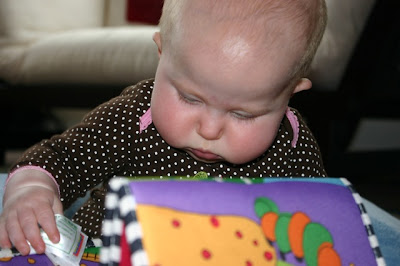Several days ago, Helena Iara and I sat on the floor playing with some of her toys. I took a small lion and pushed the button on its back, which inspired a low, electronic roar. Helena beamed with joy, then looked at me with the most wonderful, innocent of gazes, a gesture that said "cdid you see that?" better than any words can do.
With that look, Helena taught me something that I've never read in a tome of philosophy or theology: the wonder of sharing wonder, and what that means about childish joy and adult anomie.
 As children and teenagers, we learn to hide our joy. I'm not sure quite why, though I shared some ideas with Helena Iara: might we think that if others see our wonder, they'll gain that power over us? Or that we need to seem blasé and sophisticated, which are the opposite of wonder? That the definition of adult is the loss of wonder? Perhaps is is mostly about modesty: when we show so clearly what we love and what gives us joy, we become naked in front of the other, a kind of intimacy we learn to share with only a few people. Certainly, if I think of my adolescence, one of the ways I could define it is as the process by which I learned to hide wonder from others... and sometimes, even from myself.
As children and teenagers, we learn to hide our joy. I'm not sure quite why, though I shared some ideas with Helena Iara: might we think that if others see our wonder, they'll gain that power over us? Or that we need to seem blasé and sophisticated, which are the opposite of wonder? That the definition of adult is the loss of wonder? Perhaps is is mostly about modesty: when we show so clearly what we love and what gives us joy, we become naked in front of the other, a kind of intimacy we learn to share with only a few people. Certainly, if I think of my adolescence, one of the ways I could define it is as the process by which I learned to hide wonder from others... and sometimes, even from myself.Helena, however, wants to share her joy and wonder. Whether it is the feel of sand under her toes, the elation of water that splashes on her face, or a music video on YouTube, she not only expresses her joy, but also looks at Rita and me to insist that we admire it as much as she does. And as we look at the world through her eyes, we come to the same kind of joy.
Almost twenty years ago, I climbed a 20,000 foot peak in Ecuador with several Swiss and Spaniards whom I had never met before. When we came back from the summit, after (literally) pulling each other up the immense mountain, I wrote to my parents saying that I had seldom felt so close to other people in my life, that nothing builds intimacy like shared suffering, the rope that connects climbers and makes us responsible for the lives of out climbing partners. Yet even so, I never saw any of those climbers again. Perhaps the intimacy was too frightening, we had become too exposed.

Something does build intimacy even more than shared suffering, though: shared joy. Not only that bond that Rita and I develop with Helena Iara, but the one we share with my parents, with Rita's parents and brothers and sisters... with anyone that will open herself to the wonder of a little baby. It's a wonderful thing, but also a frightening one, so I suppose I understand why teenagers work so hard to cut themselves off from it. But perhaps it's also the reason that many people have children: because it gives us a small chance to return to something like that wonderful innocence.



















































